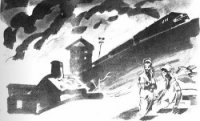Watership Down - Adams Richard George (книги полностью бесплатно .txt) 📗
"He may have made it, but Fiver thought of it for us," answered Hazel. "Wait till we get him up here! Fiver-rah!"
"Where's Hawkbit?" said Dandelion suddenly.
Although the light was still clear, Hawkbit was not to be seen anywhere on the upland. After staring about for some time, they ran across to a little mound some way away and looked again. But they saw nothing except a field mouse, which came out of its hole and began furricking in a path of seeded grasses.
"He must have gone down," said Dandelion.
"Well, whether he has or not," said Hazel, "we can't go on looking for him. The others are waiting and they may be in danger. We must go down ourselves."
"What a shame to lose him, though," said Dandelion, "just when we'd reached Fiver's hills without losing anyone. He's such a duffer; we shouldn't have brought him up. But how could anything have got hold of him here, without our seeing?"
"No, he's gone back, for sure," said Hazel. "I wonder what Bigwig will say to him? I hope he won't bite him again. We'd better get on."
"Are you going to bring them up tonight?" asked Dandelion.
"I don't know," said Hazel. "It's a problem. Where's the shelter to be found?"
They made for the steep edge. The light was beginning to fail. They picked their direction by a clump of stunted trees which they had passed on their way up. These formed a kind of dry oasis-a little feature common on the downs. Half a dozen thorns and two or three elders grew together above and below a bank. Between them the ground was bare and the naked chalk showed a pallid, dirty white under the cream-colored elder bloom. As they approached, they suddenly saw Hawkbit sitting among the thorn trunks, cleaning his face with his paws.
"We've been looking for you," said Hazel. "Where in the world have you been?"
"I'm sorry, Hazel," replied Hawkbit meekly. "I've been looking at these holes. I thought they might be some good to us."
In the low bank behind him were three rabbit holes. There were two more flat on the ground, between the thick, gnarled roots. They could see no footmarks and no droppings. The holes were clearly deserted.
"Have you been down?" asked Hazel, sniffing round.
"Yes, I have," said Hawkbit. "Three of them, anyway. They're shallow and rather rough, but there's no smell of death or disease and they're perfectly sound. I thought they might do for us-just for the moment, anyway."
In the twilight a swift flew screaming overhead and Hazel turned to Dandelion.
"News! News!" he said. "Go and get them up here."
Thus it fell to one of the rank and file to make a lucky find that brought them at last to the downs: and probably saved a life or two, for they could hardly have spent the night in the open, either on or under the hill, without being attacked by some enemy or other.
19. Fear in the Dark
The holes certainly were rough-"Just right for a lot of vagabonds [9] like us," said Bigwig-but the exhausted and those who wander in strange country are not particular about therr quarters. At least there was room for twelve rabbits and the burrows were dry. Two of the runs-the ones among the thorn trees-led straight down to burrows scooped out of the top of the chalk subsoil. Rabbits do not line their sleeping places and a hard, almost rocky floor is uncomfortable for those not accustomed to it. The holes in the bank, however, had runs of the usual bow shape, leading down to the chalk and then curving up again to burrows with floors of trampled earth. There were no connecting passages, but the rabbits were too weary to care. They slept four to a burrow, snug and secure. Hazel remained awake for some time, licking Buckthorn's leg, which was stiff and tender. He was reassured to find no smell of infection, but all that he had ever heard about rats decided him to see that Buckthorn got a good deal of rest and was kept out of the dirt until the wound was better. "That's the third one of us to get hurt: still, all in all, things could have been far worse," he thought, as he fell asleep.
The short June darkness slipped by in a few hours. The light returned early to the high down, but the rabbits did not stir. Well after dawn they were still sleeping, undisturbed in a silence deeper than they had ever known. Nowadays, among fields and woods, the noise level by day is high-too high for some kinds of animal to tolerate. Few places are far from human noise-cars, buses, motorcycles, tractors, lorries. The sound of a housing estate in the morning is audible a long way off. People who record birdsong generally do it very early-before six o'clock-if they can. Soon after that, the invasion of distant noise in most woodland becomes too constant and too loud. During the last fifty years the silence of much of the country has been destroyed. But here, on Watership Down, there floated up only faint traces of the daylight noise below.
The sun was well up, though not yet as high as the down, when Hazel woke. With him in the burrow were Buckthorn, Fiver and Pipkin. He was nearest to the mouth of the hole and did not wake them as he slipped up the run. Outside, he stopped to pass hraka and then hopped through the thorn patch to the open grass. Below, the country was covered with early-morning mist which was beginning to clear. Here and there, far off, were the shapes of trees and roofs, from which streamers of mist trailed down like broken waves pouring from rocks. The sky was cloudless and deep blue, darkening to mauve along the whole rim of the horizon. The wind had dropped and the spiders had already gone well down into the grass. It was going to be a hot day.
Hazel rambled about in the usual way of a rabbit feeding-five or six slow, rocking hops through the grass; a pause to look round, sitting up with ears erect; then busy nibbling for a short time, followed by another move of a few yards. For the first time for many days he felt relaxed and safe. He began to wonder whether they had much to learn about their new home.
"Fiver was right," he thought. "This is the place for us. But we shall need to get used to it and the fewer mistakes we make the better. I wonder what became of the rabbits who made these holes? Did they stop running or did they just move away? If we could only find them they could tell us a lot."
At this moment he saw a rabbit come rather hesitantly out of the hole furthest from himself. It was Blackberry. He, too, passed hraka, scratched himself and then hopped into the full sunlight and combed his ears. As he began to feed, Hazel came up and fell in with him, nibbling among the grass tussocks and wandering on wherever his friend pleased. They came to a patch of milkwort-a blue as deep as that of the sky-with long stems creeping through the grass and each minute flower spreading its two upper petals like wings. Blackberry sniffed at it, but the leaves were tough and unappetizing.
"What is this stuff, do you know?" he asked.
"No, I don't," said Hazel. "I've never seen it before."
"There's a lot we don't know," said Blackberry. "About this place, I mean. The plants are new, the smells are new. We're going to need some new ideas ourselves."
"Well, you're the fellow for ideas," said Hazel. "I never know anything until you tell me."
"But you go in front and take the risks first," answered Blackberry. "We've all seen that. And now our journey's over, isn't it? This place is as safe as Fiver said it would be. Nothing can get near us without our knowing: that is, as long as we can smell and see and hear."
9
Bigwig's word was hlessil, which I have rendered in various places in the story as wanderers, scratchers, vagabonds. A hlessi is a rabbit living in the open, without a hole. Solitary bucks and unmated rabbits who are wandering do this for quite long periods, especially in summer. Bucks do not usually dig much in any case, although they will scratch shallow shelters or make use of existing holes where these are available. Real digging is done for the most part by does preparing for litters.




